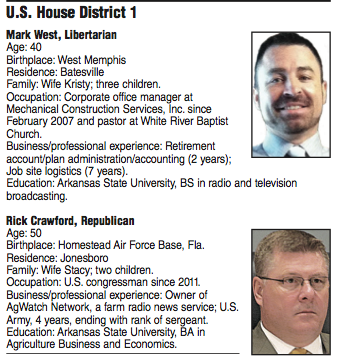A former door-to-door campaigner for U.S. Rep. Rick Crawford seeks to upset the three-term congressman from Arkansas' 1st Congressional District.
Mark West, a business payroll manager and part-time pastor from Batesville, says he became disillusioned with the Republican after working on Crawford's 2010 campaign, and sought to mount his own Libertarian Party bid based on what he calls the "nonaggression principle."
But Crawford, a former farm broadcaster and Army sergeant, dismissed his opponent's platform -- which includes limited foreign intervention and a movement to voluntary taxation -- saying it takes reasonable criticisms of the federal government too far.
"It seems like we're toying with the idea that we should espouse anarchy and every man for himself. That's not what this country is about," Crawford said in an interview at his Jonesboro offices.
[INTERACTIVE LIST: Find the local races in your county or city]
The U.S. House seat is a two-year term with an annual salary of $174,000, plus benefits. The election is Nov. 8.
Crawford, who assumed the office in 2011 after Democratic incumbent Marion Berry decided not to seek re-election, defeated Heber Springs Mayor Jackie McPherson, a Democrat, in 2014 with 63 percent of the vote.
No Democrats filed to run in 2016 for the 1st District seat, a former stronghold for the party. The district includes much of the Delta, the state's entire eastern border and parts of the Ozark Mountains as far west as Searcy County.
West described his platform as "pure Libertarian philosophy," in which the government's role is limited to enforcing laws through courts, as well as providing some basic services such as fire and police departments. On the federal level, West said, Congress should legalize all drugs and narcotics, make Social Security an optional program and phase out the income tax.
"What the nonaggression principle is about, is, I am free to do whatever I want to with my life, with my property, so long as I am not bringing harm onto another individual," West said. "Where we need government in essence is where people cross that line."
In order for the government to take in revenue, West said it should rely more on use taxes such as the gas tax, as well as on selling government bonds as a "voluntary taxation" to pay for other services such as the military.
"People will be willing to pay taxes that are important to them," West said.
Crawford said people expect the government to provide certain services such as the military, as well as roads and infrastructure. He touted his work in Washington, D.C., to obtain a waiver for certain agricultural vehicles to continue traveling along U.S. 63 as the road is redesignated Interstate 555.
A member of the House Committee on Transportation and Infrastructure, Crawford said he would also like to see U.S. 67 from Little Rock to Walnut Ridge designated as an extension of Interstate 57, forming an interstate link to Chicago.
The congressman said it was a "mistake" not to index the federal gas tax to inflation when it was last raised to 18.4 cents per gallon in 1993. He said he would be open to discussing another raise on the gas tax to pay for highways, noting that Arkansas voters passed a half-cent raise in the state sales tax for road spending in 2012.
"Can we do it at the federal level? I don't know. I think there's very little trust right now in the federal level," Crawford said.
Both candidates said regulations were driving distrust among voters and stifling economic expansion in the district, and in separate interviews each singled out the Environmental Protection Agency as especially harmful.
"The EPA is probably one of the most egregious violators in terms of over-regulating agriculture," Crawford said. "I think there's a disconnect there that they simply don't understand."
West agreed, saying the agency "has been awful with its creep and overreach, far beyond the mission that it was given."
The two candidates also agreed that expanding the United States' trade relationship with Cuba would be a benefit to Delta rice farmers.
West said he supported free trade deals with other countries regardless of their governments, as long as they uphold the bargain. Crawford also said he supported free trade, but believed it was better for the federal government to negotiate those deals one-on-one with other nations and avoid multilateral agreements such as the 12-nation Trans-Pacific Partnership.
Crawford also said he supported using military force in overseas affairs, arguing that while the country is not imperialist, its values include "liberating oppressed people." Pointing to Mosul, Iraq, which fell to the Islamic State extremist group in 2014 after soldiers and police abandoned their posts, Crawford criticized the earlier decision to withdraw U.S. forces from the country.
"Had there been Americans present, just presence along, that would not have happened," Crawford said. "It has to do with their culture; they would not have wanted a nation like the United States to witness them taking their uniforms off and leaving. Wouldn't have happened."
West said large deployments of U.S. forces overseas had unnecessarily inflated the budget deficit while wearing out soldiers. While criticizing U.S. involvement in Iraq, West said he would support limited interventions "with a clear objective."
Metro on 10/30/2016

